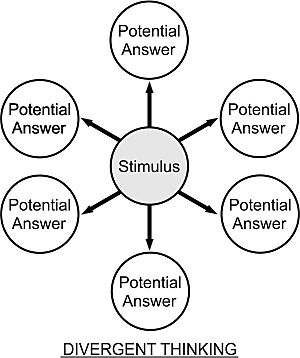Divergent thinking facts for kids
Divergent thinking is a special way of thinking that helps you come up with lots of new and creative ideas. Instead of looking for just one right answer, you explore many different possibilities. It's like your brain is freely exploring all sorts of paths at once!
When you think divergently, ideas pop up quickly and connect in surprising ways. It's a "non-linear" process, meaning it doesn't follow a straight line. After you've generated many ideas, you often use convergent thinking. This is when you narrow down your ideas to find the best or most correct solution.
A psychologist named J.P. Guilford first talked about divergent and convergent thinking in 1956.
Contents
How to Boost Your Divergent Thinking
Want to get better at coming up with lots of ideas? Here are some fun activities that can help:
- Ask lots of questions: Don't be afraid to wonder "what if?" or "how about...?"
- Brainstorm: Write down every idea that comes to mind, no matter how silly it seems at first.
- Mind mapping: Draw a central idea and then branch out with related thoughts and connections.
- Keep a journal: Write down your thoughts, ideas, and observations regularly.
- Play games: Tabletop role-playing games can encourage creative problem-solving.
- Make art: Drawing, painting, or sculpting can help you think outside the box.
- Free writing: Pick a topic and write non-stop about it for a few minutes without worrying about grammar or spelling. Just let your thoughts flow!
Playfulness and Creativity
Did you know that being playful, especially when you're younger, can be linked to divergent thinking? Studies have looked at how playful kindergarten kids are and how that connects to their creativity later on.
One study found that kids who were more spontaneous, joyful, and had a good sense of humor often showed signs of divergent thinking. These traits are similar to what you see in creative teenagers and adults. This suggests that playing freely as a child might help build the skills needed for creative thinking later in life.
Understanding this link can help parents and teachers. They can encourage playfulness in young children. This helps kids develop their divergent thinking abilities as they grow up.
How Mood Affects Your Ideas
Your mood can actually change how well you think divergently! A study at the University of Bergen in Norway looked at this. Students were asked to do creative tasks after their mood was checked.
The results showed that people in a positive mood came up with more ideas. Those in a negative mood tended to focus on finding the "perfect" idea, which meant they didn't generate as many different solutions.
Results showed natural positive mood to facilitate significantly task performance and negative mood to inhibit it… The results suggest that persons in elevated moods may prefer satisficing strategies, which would lead to a higher number of proposed solutions. Persons in a negative mood may choose optimizing strategies and be more concerned with the quality of their ideas, which is detrimental to performance on this kind of task.
This means that when you're feeling good, your brain is more flexible. You can see connections between different ideas more easily. This helps you come up with unique and varied solutions to problems. So, being in a good mood can give you a creative advantage!
Sleep and Creative Thinking
Not getting enough sleep can also affect your ability to think divergently. Even if you're really motivated to do well, sleep loss can make it harder to come up with new ideas.
One study found that people who were awake for 32 hours performed worse on creative word tasks and planning tests. This shows that even just one night of poor sleep can impact your divergent thinking. Interestingly, tasks that require convergent thinking (finding one correct answer) are less affected by short-term sleep loss.
So, getting enough sleep is important for keeping your creative thinking sharp!
See also
 In Spanish: Pensamiento divergente para niños
In Spanish: Pensamiento divergente para niños
 | Ernest Everett Just |
 | Mary Jackson |
 | Emmett Chappelle |
 | Marie Maynard Daly |


